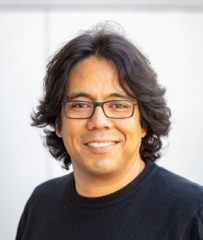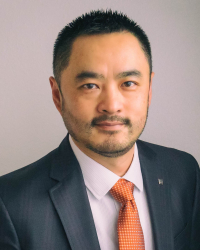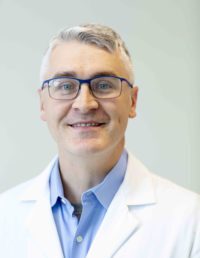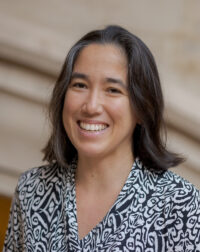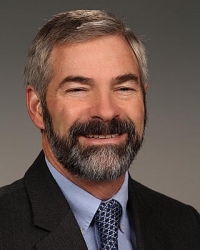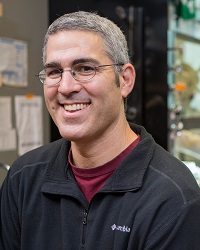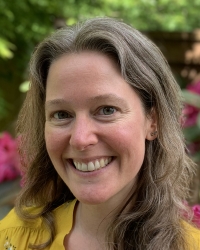Juan Carlos Idrobo is an Associate Professor in the Materials Science & Engineering Department. His research consists in applying analytical techniques in electron spectroscopy within monochromated and aberration-corrected scanning transmission electron microscopy to study the structure, electronic, magnetic, thermal, optical and topological properties of materials.
Position: IRG 1
Stefan Stoll
Stefan Stoll is a Professor and the Associate Chair of Research in the Department of Chemistry at the University of Washington. The Stoll Research Group's primary focus is advanced Electron Paramagnetic Resonance (EPR) spectroscopy, a set of techniques that allows us to measure molecules with unpaired electrons such as organic radicals and transition metal ions and learn about their structure and nano-environment.
Dianne Xiao
Dianne Xiao is an Assistant Professor of Chemistry. The Xiao research group develops new strategies to control the structure of porous frameworks and dense coordination solids across multiple length scales, from the molecular to the nano-, meso-, and macroscale. In particular, we are interested in how controlling both the local and long range self-assembly and structure of porous materials can lead to enhanced transport properties, new catalytic activity, and novel emergent behavior.
Xiaosong Li
Xiaosong Li is the Larry R. Dalton Endowed Chair in Chemistry, Associate Dean for Research, College of Arts & Sciences, and the Associate Vice Provost for Research Cyberinfrastructure. His research focuses on developing and applying time-dependent relativistic and non-relativistic electronic structure theories for studying excited state chemical processes that underpin energy conversion, photocatalysis, and ultrafast spectroscopies.
Scott Dunham
Professor Scott Dunham, EE Dept., University of Washington .The Nanotechnology Modeling Lab at the University of Washington is part of the Electrical Engineering Department in the College of Engineering. The efforts within the Lab are focused on obtaining basic understanding of nanofabrication processes and device operation, applying that knowledge to produce better models, simulators and devices. Research within the Lab includes model development for process simulation, application of a wide range of simulation and modeling tools for device design and optimization, and experimental studies of device fabrication.
Peter Pauzauskie
Since 2010 Prof. Pauzauskie has served as an assistant professor in the Materials Science & Engineering department at the University of Washington. Research in the Pauzauskie lab is focused on the design, synthesis, and experimental characterization of biocompatible nanomaterials for targeted photothermal therapies.
Kai-Mei Fu
Kai-Mei Fu is Associate Professor of Physics and Electrical Engineering at University of Washington.
In the Optical Spintronics and Sensing Lab we study defects in crystals. Defects have historically played an essential role in classical electronic/optical devices. Now new, nanoscale, devices are being developed based on the quantum properties of defects. We are occupied with the following questions:
* What are the fundamental properties of a known defect state? Alternatively, by measuring the properties of an unknown state, can we identify it?
* How can the quantum properties of a defect be engineered and controlled?
* What new technologies can quantum properties of defects enable?
* What new capabilities can be realized through solid-state device integration of defects?
James DeYoreo
Jim De Yoreo is an Affiliate Professor of Chemistry and of Materials Science and Engineering. Research in the De Yoreo lab focuses on understanding the pathways and dynamics of nucleation, growth, transformation and self-assembly in synthetic, biomolecular, and geochemical environments. Insights into the underlying mechanisms is obtained by using in situ microscopy and spectroscopy tools to directly probe the organization of atomic, molecular and nanoparticle species.
Daniel Gamelin
Daniel Gamelin holds the Nicole A. Boand Endowed Chair in Chemistry at the UW. His research involves the development of new inorganic materials with unusual electronic structures that give rise to desirable photophysical, photochemical, magnetic, or magneto-optical properties. Honors for his work include the Presidential Early Career Award for Scientists and Engineers (PECASE), the ACS Inorganic Lectureship Award, the Dalton Transactions Americas Lectureship Award, the ACS Inorganic Nanoscience Award, and the Debye Chair Professorship at Utrecht University. He is a Fellow of the AAAS and the RSC, a Senior Fellow of the Zukunftskolleg at the University of Konstanz, and an elected member of the Washington State Academy of Sciences.
Brandi Cossairt
Brandi Cossairt is a Professor of Chemistry. Research in the Cossairt lab centers on the synthetic inorganic chemistry of solution-phase nanomaterials with emphasis on developing new emitters for energy-efficient LED technologies, absorbers for solar energy harvesting, and catalysts for chemical synthesis and fuels generation.


